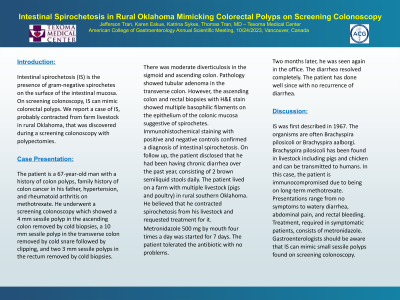Tuesday Poster Session
Category: Colorectal Cancer Prevention
P3212 - Intestinal Spirochetosis in Rural Oklahoma Mimicking Colorectal Polyps on Screening Colonoscopy
Tuesday, October 24, 2023
10:30 AM - 4:00 PM PT
Location: Exhibit Hall

Has Audio
- JT
Jefferson Tran
TMC
Denison, TX
Presenting Author(s)
Jefferson Tran, , Karen Eskue, , Katrina Sykes, , Thomas Tran, MD
TMC, Denison, TX
Introduction: Intestinal spirochetosis (IS) is the presence of gram-negative spirochetes on the surface of the intestinal mucosa. On screening colonoscopy, IS can mimic colorectal polyps. We report a case of IS, probably contracted from farm livestock in rural Oklahoma, that was discovered during a screening colonoscopy with polypectomies.
Case Description/Methods: The patient is a 67-year-old man with a history of colon polyps, family history of colon cancer in his father, hypertension, and rheumatoid arthritis on methotrexate. He underwent a screening colonoscopy which showed a 4 mm sessile polyp in the ascending colon removed by cold biopsies, a 10 mm sessile polyp in the transverse colon removed by cold snare followed by clipping, and two 3 mm sessile polyps in the rectum removed by cold biopsies. There was moderate diverticulosis in the sigmoid and ascending colon. Pathology showed tubular adenoma in the transverse colon. However, the ascending colon and rectal biopsies with H&E stain showed multiple basophilic filaments on the epithelium of the colonic mucosa suggestive of spirochetes. Immunohistochemical staining with positive and negative controls confirmed a diagnosis of intestinal spirochetosis. On follow up, the patient disclosed that he had been having chronic diarrhea over the past year, consisting of 2 brown semiliquid stools daily. The patient lived on a farm with multiple livestock (pigs and poultry) in rural southern Oklahoma. He believed that he contracted spirochetosis from his livestock and requested treatment for it. Metronidazole 500 mg by mouth four times a day was started for 7 days. The patient tolerated the antibiotic with no problems. Two months later, he was seen again in the office. The diarrhea resolved completely. The patient has done well since with no recurrence of diarrhea.
Discussion: IS was first described in 1967. The organisms are often Brachyspira pilosicoli or Brachyspira aalborgi. Brachyspira pilosicoli has been found in livestock including pigs and chicken and can be transmitted to humans. In this case, the patient is immunocompromised due to being on long-term methotrexate. Presentations range from no symptoms to watery diarrhea, abdominal pain, and rectal bleeding. Treatment, required in symptomatic patients, consists of metronidazole. Gastroenterologists should be aware that IS can mimic small sessile polyps found on screening colonoscopy.
Disclosures:
Jefferson Tran, , Karen Eskue, , Katrina Sykes, , Thomas Tran, MD. P3212 - Intestinal Spirochetosis in Rural Oklahoma Mimicking Colorectal Polyps on Screening Colonoscopy, ACG 2023 Annual Scientific Meeting Abstracts. Vancouver, BC, Canada: American College of Gastroenterology.
TMC, Denison, TX
Introduction: Intestinal spirochetosis (IS) is the presence of gram-negative spirochetes on the surface of the intestinal mucosa. On screening colonoscopy, IS can mimic colorectal polyps. We report a case of IS, probably contracted from farm livestock in rural Oklahoma, that was discovered during a screening colonoscopy with polypectomies.
Case Description/Methods: The patient is a 67-year-old man with a history of colon polyps, family history of colon cancer in his father, hypertension, and rheumatoid arthritis on methotrexate. He underwent a screening colonoscopy which showed a 4 mm sessile polyp in the ascending colon removed by cold biopsies, a 10 mm sessile polyp in the transverse colon removed by cold snare followed by clipping, and two 3 mm sessile polyps in the rectum removed by cold biopsies. There was moderate diverticulosis in the sigmoid and ascending colon. Pathology showed tubular adenoma in the transverse colon. However, the ascending colon and rectal biopsies with H&E stain showed multiple basophilic filaments on the epithelium of the colonic mucosa suggestive of spirochetes. Immunohistochemical staining with positive and negative controls confirmed a diagnosis of intestinal spirochetosis. On follow up, the patient disclosed that he had been having chronic diarrhea over the past year, consisting of 2 brown semiliquid stools daily. The patient lived on a farm with multiple livestock (pigs and poultry) in rural southern Oklahoma. He believed that he contracted spirochetosis from his livestock and requested treatment for it. Metronidazole 500 mg by mouth four times a day was started for 7 days. The patient tolerated the antibiotic with no problems. Two months later, he was seen again in the office. The diarrhea resolved completely. The patient has done well since with no recurrence of diarrhea.
Discussion: IS was first described in 1967. The organisms are often Brachyspira pilosicoli or Brachyspira aalborgi. Brachyspira pilosicoli has been found in livestock including pigs and chicken and can be transmitted to humans. In this case, the patient is immunocompromised due to being on long-term methotrexate. Presentations range from no symptoms to watery diarrhea, abdominal pain, and rectal bleeding. Treatment, required in symptomatic patients, consists of metronidazole. Gastroenterologists should be aware that IS can mimic small sessile polyps found on screening colonoscopy.
Disclosures:
Jefferson Tran indicated no relevant financial relationships.
Karen Eskue indicated no relevant financial relationships.
Katrina Sykes indicated no relevant financial relationships.
Thomas Tran indicated no relevant financial relationships.
Jefferson Tran, , Karen Eskue, , Katrina Sykes, , Thomas Tran, MD. P3212 - Intestinal Spirochetosis in Rural Oklahoma Mimicking Colorectal Polyps on Screening Colonoscopy, ACG 2023 Annual Scientific Meeting Abstracts. Vancouver, BC, Canada: American College of Gastroenterology.
